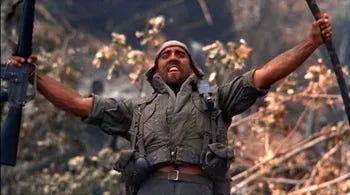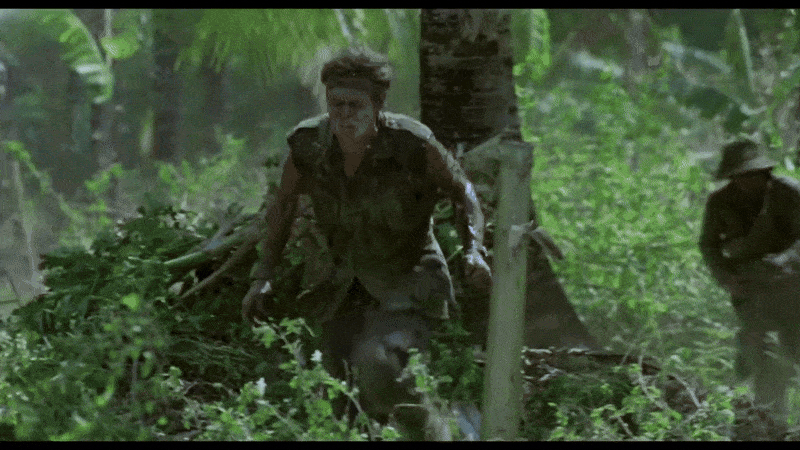Reeling Backward: Platoon (1986)
Oliver Stone's harrowing war picture was the first movie that felt like a genuine depiction of that terrible war, and brought collective catharsis for America's tragedy in Vietnam.
I have a vivid memory of Oliver Stone’s “Platoon” opening in theaters — but it wasn’t in front of a screen.
In 1986 I was a high schooler working in a movie theater, mostly as an usher but also concessions, doorman, changing the marquee — wherever I was needed. Eventually I would learn to run the projectors (35mm and 70mm) and became an assistant manager, too.
There was a big buildup for Oliver Stone’s Vietnam drama, and the crowds during opening weekend were massive. We had to line people up in roped pens to wait for the previous showing to let out.
Vietnam vets came in droves to see it, often in groups wearing message clothing or even their own gear. One fellow bellowing orders to his troop had on camo fatigues, head band and shoulder harness — possibly his actual field kit — and even carried a wooden staff. Thinking back, he looked astonishingly like Rhah, one of the grizzled soldiers played by Francesco Quinn.
The movie became a cultural and cinematic triumph — winning four Oscars, including Best Picture, Best Director for Stone, sound and editing — and it wasn’t hard to see why. People had become frustrated by the films about Vietnam, especially in the aftermath of America’s defeat.
(Though some still try vainly to argue it wasn’t one.)
“Coming Home,” “Apocalypse Now” and “Deer Hunter” were artsy stories about distinct people’s experiences with the war and its aftermath. The filmmakers used the war as the basis for very good movies, but they weren’t about Vietnam. Then there was jingoistic crap like Chuck Norris’ “Missing in Action.”
By the mid-’80s, with the country finally on an upswing from its economic and cultural malaise, it seemed like Hollywood had moved on from Vietnam.
Then along came Stone, himself a veteran, to craft a story that was not just very personal based on his own experiences, but gave voice to an unspoken universal need for catharsis about America’s misadventures and (at the outer edge) war crimes in a tiny Asian country of little strategic importance.
It was one of those rare movies everyone immediately recognized as not just excellent but important.
Stone, already an Oscar-winning screenwriter for “Midnight Express,” would go on to one of the most fruitful directing stretches of all Hollywood history: “Wall Street,” “Talk Radio,” “Born on the Fourth of July,” “The Doors,” “JFK,” “Natural Born Killers,” “Nixon,” “Any Given Sunday” — all commercial and/or critical hits that would garner him seven more Academy Awards nominations and one win.
(And then came the disaster of “Alexander,” followed by an increasing presence as a partisan political voice paralleling diminishment as a filmmaker, to the point 2016’s “Snowden” was the last thing of his I’d even heard of, let alone seen.)
It was clear that Chris Taylor, the impossibly fresh-faced recruit played by Charlie Sheen (decades before the tiger blood) was a stand-in for Stone himself. Arriving in country in late 1967, he is the rare rich, educated kid who actually volunteered for service in contrast to the largely poor, disproportionately Black and brown draftees. His voiceover narration takes the form of letters written to his grandmother, the only relative he can stand.
“Hell is the impossibility of reason,” he quotes to her in an early missive describing the place, attributing it to some forgotten author. (In fact, Stone penned the line himself.)
The parable of the story is about Taylor being caught between the middle of two ethos, espoused by the lead sergeants of their platoon. At first he is attracted to the bravado and first-rate soldiering of Staff Sgt. Barnes, played by Tom Berenger (the biggest star at the time, who received top billing in the credits). Barnes is ruthlessly effective, does his duty without question, and harnesses his rage to overcome seemingly any obstacle.
Physically Barnes is a walking dichotomy, a beautiful strapping man etched with deep scars all over his body but especially his face, which seems like a badly constructed puzzle. With his clear blue eyes that seem almost tender in the rare moments he lets his guard down, Barnes resembles a Botticelli angel who became corrupted.
In contrast is Sgt. Elias (Willem Dafoe), easygoing and eclectic, the one leader who is willing to help the new recruits — “cherries,” the seasoned grunts dub them — like Taylor, who tend to die within their first weeks because nobody teaches them anything. Unlike Barnes he is small and wiry, his hair longish for the military, an impish smile often playing across his face.
Elias is a unicorn, a soldier who has been in Vietnam for three years, meaning he re-upped at least twice, and he never complains about the scorching, insect-infested conditions or the high chance of dying at any moment. Despite this, he is cynical about the country’s increasingly messy involvement and predicts to Taylor they are destined to lose the war.
When they’re back in camp, Elias and Barnes are the unofficial mascots of two centers around which roughly half the platoon congregates: the barracks, where Barnes leads neverending poker games and Budweiser swilling, and a bunker where Elias and the other hopheads smoke pot, listen to music — notably Smokey Robinson’s “The Tracks of My Tears” — and enjoy a fuzzy camaraderie.
(Notably, almost all the Black and Latino soldiers are in the latter.)
Elias seems content to let Barnes take the lead in the field, though he subtly influences the utterly incompetent Lieutenant Wolfe (Mark Moses), an Ivy League type who’s merely an indifferent figurehead.
Both Dafoe and Berenger would receive Best Supporting Actor Oscar nominations. (Losing to Michael Caine for “Hannah and Her Sisters.”)
The sergeants’ simmering detente erupts into open conflict when the platoon is ordered to search a Vietnamese village. They find a bunch of Viet Cong (VC) weapons and a suspicious (to Barnes) amount of stored rice, leading to them burning the whole place down after Barnes cold-bloodily murders the wife of the village elder to compel his cooperation, threatening to kill his little girl by holding gun to her head to boot.
Elias is determined to see Barnes court-martialed, and the rest of the movie tracks as the contest between these two factions splits the platoon asunder. It culminates with Barnes shooting Elias in the jungle, claiming to Taylor that the VC got him, only to have a wounded Elias emerge for a doomed sprint for the fleeing helicopter — a slow-motion ballet of tragedy that is clearly the movie’s most iconic moment.
(Nonetheless, as I and others have pointed out, you can clearly see the wires running down Dafoe’s arm to the blood squibs in his vest, his thumb pressed over the detonator to fire them. It’s a shockingly amateurish flaw, and yet the moment is so emotionally wrenching no one noticed.)
The contrast between Elias and Barnes is also evident in the way they move in combat. Barnes is textbook, M-16 tucked into his shoulder slot just so, lumbering along at a steady pace like an apex predator. Elias moves like a silky panther, sprinting from shadow to shadow, firing from the hip.
I also noticed that while Barnes and most of the other soldiers refer to the Vietnamese with the casually offensive epithet of “gooks,” Elias refers to them by the somewhat softer “dinks.”
I saw “Platoon,” or fragments of it, many times during that winter of popping in and out of theaters when my ushering duties were done, but I’m not sure if I’ve seen it more than once or twice since. Two things struck me in a recent viewing, one I’d noticed as a nascent movie hound and the other just now.
The thing I appreciated back then was the incredible distinctiveness of a large cast of characters. That’s something that’s really hard for movies to do, as supporting roles tend to just slide into a generic cloud of background faces.
Here, more than a dozen are instantly recognizable as distinct personalities, many played by young actors who would go on to significant careers.
They include:
John C. McGinley as Sgt. Red O'Neill, Barnes’ chief sycophant. He play-acts at being a cynical veteran, but his thousand-yard stare feels practiced.
Keith David as King, a soulful fellow who becomes Taylor’s best friend and most immediate mentor.
Kevin Dillon as Bunny, the baby-faced killer who openly expresses that he likes being in the ‘Nam.
Forest Whitaker as Big Harold, a gentle giant.
Johnny Depp as Lemer, the kindly interpreter who speaks Vietnamese.
Reggie Johnson as Junior, the one Black soldier who chiefly hangs with the Barnes coterie, though he constantly grouses about everything, especially being paired with the psychotic Bunny.
Richard Edson as Sal, who dies a horrible death because of a booby trap (and stupidity).
Tony Todd as Warren, a gangly sergeant who is secretly hooked on hard drugs.
Corey Glover as Francis, a relatively new recruit who Taylor finds an easy camaraderie with, a rare kind soul — and a bit of a coward, though he finds his mettle in the end.
Dale Dye as the no-nonsense Captain Harris, barking orders ineffectually over the radio to overwhelmed infantrymen.
I already mentioned Quinn as Ramucci aka Rhah, who talks in a strained growl and seems one of the more balanced soldiers in the group.
The thing I noticed only more recently was the very simple story structure of “Platoon.” I had remembered it as being a very long film, but it clocks in just under two hours. And really there are only four sections to it.
There’s Taylor’s arrival in Vietnam and initial firefight, in which he is lightly wounded. His growing more experienced and jaded, coinciding with King befriending him and bringing him into the Elias faction. The extended village tragedy, in which any semblance of Taylor’s innocence is lost (including his own cruel taunting of a one-eyed, one legged teen.) And the killing of Elias leading to Taylor’s seemingly inevitable confrontation with Barnes, representing his own sense of guilt.
In general I’m not a big fan of when a movie has a character more or less just blurt out its main themes — show, don’t tell. But Taylor’s final piece of narration feels justified, serving as both coda and confession:
“I think now, looking back, we did not fight the enemy; we fought ourselves. And the enemy was in us. The war is over for me now, but it will always be there, the rest of my days as I'm sure Elias will be, fighting with Barnes for what Rhah called possession of my soul. There are times since, I've felt like the child born of those two fathers.”
It’s hard to believe that “Platoon” is nearly 40 years old now. Its power seems undiminished to me, though I don’t think it gets talked about as one of the great movies of its era like it deserves.







